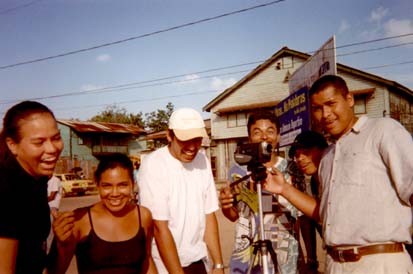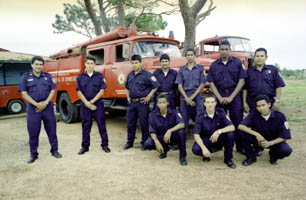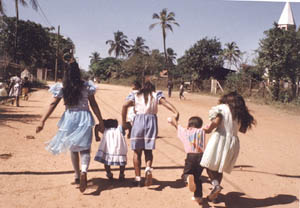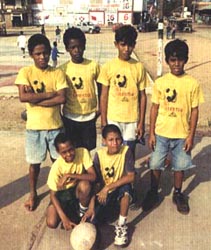BURLINGTON/ BILWI SISTER CITY PROGRAM
offering support for
the following ongoing projects:
COMMUNITY VIDEO PROJECT
Since 2000 the Sister City Program has supported
a video project based at URACCAN (the Rigional Autonomous University of
the Caribbean Coast of Nicaragua), assisting with both equipment
and training. The mission of the project includes providing technical training
for students, establishment of a visual component within the curriculum
of URACCAN, documentation of life in Nicaragua's Northern Autonomous Region,
and provision through cable television a vehicle for community discourse.  While
the Autonomy Law of 1987 acknowledges the diversity of ecologies, cultures
and traditions of people living on the Atlantic Coast and gives them rights,
the Autonomy Law has never been implemented in any meaningful way, with
actual political and economic power residing with the Central Government
in Managua. Because there are no local newspapers, and most television
programming comes from outside, there have been limited vehicles for the
expression and sharing of local viewpoints, and the perspectives of the
peoples of the Atlantic Coast have been poorly represented.
While
the Autonomy Law of 1987 acknowledges the diversity of ecologies, cultures
and traditions of people living on the Atlantic Coast and gives them rights,
the Autonomy Law has never been implemented in any meaningful way, with
actual political and economic power residing with the Central Government
in Managua. Because there are no local newspapers, and most television
programming comes from outside, there have been limited vehicles for the
expression and sharing of local viewpoints, and the perspectives of the
peoples of the Atlantic Coast have been poorly represented.
Students of the video project
have produced hours of local video, conducting interviews, documenting
life, and examining issues and events important to residents of the region.
Jaime Ruiz of the local cable company has promoted the videos over local
television. The video project impacts a broad spectrum of TV watchers in
Bilwi, and videos made by the group have been shown on local Burlington
Public Access television, informing residents of theBurlington community
about life in their sister city.
The Sister City Program is committed to supporting
this very successful project, and seeks support for maintaining and upgrading
equipment as well as training. For information on the Video Project contact
Dan Higgins at <dhiggins@zoo.uvm.edu>
VIDEO
PROJECT REPORT/ may 2000 VIDEO
PROJECT IMAGES see
VIDEO from the project
EQUIPMENT FOR BILWI FIRE DEPARTMENT
Among the Sister City's ongoing relationships with
Bilwi is the that of the firefighters from both communities. Since the
mid 1990s the Burlington Fire Department has donated decommissioned equipment
to the Sister City Program for transport to the fire department in Puerto
Cabezas  and
the Sister City Program considers the relationship between our two firedepartments
a top priority. In the summer of 1999 Carlos Largaespada, the fire chief
of Puerto Cabezas, visited and trained for a week with the Burlington Fire
Department, and in the sprinig of 2001 Captain Jim Hendry, of the Burlington
Fire Department, spent time with his counterparts in Puerto Cabezas . In
the spring of 2001 the Sister City Program raised funds for shipping several
tons of equipment to the fire department in "Port".
and
the Sister City Program considers the relationship between our two firedepartments
a top priority. In the summer of 1999 Carlos Largaespada, the fire chief
of Puerto Cabezas, visited and trained for a week with the Burlington Fire
Department, and in the sprinig of 2001 Captain Jim Hendry, of the Burlington
Fire Department, spent time with his counterparts in Puerto Cabezas . In
the spring of 2001 the Sister City Program raised funds for shipping several
tons of equipment to the fire department in "Port".
In 2002 firemen in Burlington located
a fire
truck for "Port" that was finally shipped to the Puerto Cabezas Fire
Department and arrived in August, 2003.
TRADE
SCHOOL and TRAINING PROJECT
Since 1996 Charlie
Delaney has made a trip each year to Bilwi, taking simple hand tools, working
with local young men, and completing a small renovation project on some
needy home in the community. With the job completed, he has left the tools
with his helpers. These low impact projects have taught the young men building
skills, repaired the structures of local houses, and given a sense of purpose
in an area where employment opportunities are scarce.
Charlie has a long-term vision for establishing
a technical trade school for young people in Bilwi and has made progress
toward that goal already. In 2001 Charlie leased six acres of land from
Karata (one of the 10 indigenous communities in whose name all the land
is owned) in the name of his non-profit organization, Waubunowin. He obtained
from the Municipality certification of Waubunowin as a social cultual organizatiion.
His vision for the future includes putting up a building for the school,
obtaining tools and staffiing for the school, producing a curriculum, and
getting recognition and certification from the Nicaraguan Department of
Educatiion..
For information about the project contact
Charlie at (802)863-6002.
FUNDRAISING
FOR MAUREEN COURTNEY SCHOOL
The Maureen Cortney Special Education Center sits
on a cliff overlooking the Atlantic Coast, at the edge of Puerto Cabezas/Bilwi.
Started in 1991with a handful of teachers and 42 students, the school now
serves 200 students  and
employs more than a dozen teachers.
and
employs more than a dozen teachers.
Sister Katie Schilling, of the Sisters of St. Ines
in Wisconsin, has weathered the challenges of educating children and young
adults with disabilities on a meager budget. Some students have speech
and hearing problems, while others suffer from malnutrition or abuse or
have learning and behavoiral problems. At Maureen Courtney, the only school
of its kind in the region, girls and boys learn reading, writing, and math
along with sewing, baking and carpentry. They learn the principles of the
Catholic faith; kindness, tolerance and respect for human and religious
differences.Maureen Courtney also boasts a winning baseball team.
During 2002 the Sister City Program chose the Maureen
Courtney School as recipient for fundraising efforts. We were able to raise
funds for the meals program there and for helping with teacher salaries.
SPORTS
 Because Nicaragua's Atlantic Coast is major stop in the drug trade route
from Columbia to the United States, the people of Puerto Cabezas, particularly
the youth, suffer from alcoholism and drug abuse. Sports programs have
been identified as a positive way to keep kids away from drugs. The Sister
City Program has made small steps to support youth empowerment and anti
drug efforts on the coast. In the summer of 1998 the Program hosted
a member of Port's anti drug commission, Jose Rossman, and a young baseball
player, Richard Omier Bendles, in Burlington. While Jose learned more about
youth programs at the King Street Youth Center, Richard connected with
kids from the little league and starred as a bat-boy for the Vermont Expos,
inspiring the Sister City Program's ongoing drive to collect sports equipment
for youth teams in Puerto Cabezas. Anyone able to donate baseball, basketball,
or soccer uniforms or equipment for girls' and boys' teams in Puerto Cabezas
please contact the Sister City Program.
Because Nicaragua's Atlantic Coast is major stop in the drug trade route
from Columbia to the United States, the people of Puerto Cabezas, particularly
the youth, suffer from alcoholism and drug abuse. Sports programs have
been identified as a positive way to keep kids away from drugs. The Sister
City Program has made small steps to support youth empowerment and anti
drug efforts on the coast. In the summer of 1998 the Program hosted
a member of Port's anti drug commission, Jose Rossman, and a young baseball
player, Richard Omier Bendles, in Burlington. While Jose learned more about
youth programs at the King Street Youth Center, Richard connected with
kids from the little league and starred as a bat-boy for the Vermont Expos,
inspiring the Sister City Program's ongoing drive to collect sports equipment
for youth teams in Puerto Cabezas. Anyone able to donate baseball, basketball,
or soccer uniforms or equipment for girls' and boys' teams in Puerto Cabezas
please contact the Sister City Program.
In
April, 2001, a delegation of 13 Little League baseball players from
Burlington, along with nine parents, traveled to Puerto Cabezas for a week
of baseball games with young baseball players from the region.
In August the Vermonters reciprocated, bringing a delegation of young Nicaraguan
baseball players to Burlington to play baseball in Vermont.
ANTI-DRUG EFFORTS
During the summer of 2000 Sister City Board member David Hutchinson
arranged for scholarships through the Institute for Addiction Studies
to bring five Nicaraguans to Connecticut for a week long Institute workshop
on drug counselling. David continues as a member of the Institute, which
is considering other more long term projects that might involve exchange
with residents of Puerto Cabezas. For information on Institute activity
contact David <hutchind@badger.jsc.vsc.edu>.
MUNICIPAL COMPUTER
CENTER
In 1995 Jose Chaparro, a student at the University of Vermont, persuaded
the UVM computer center to donate several outdated computers that he took
to Puerto Cabezas. With the support of the Mayor's Office in Port a computer
/Center was established offering low-cost computer training for people
in the community. UVM contributed several more computers during 1999, as
did TECSCHANGE in Boston; Puerto Cabezas'Sister city in Spain also
donated several computers to the center, and in March 1999 the Puerto Cabezas
Computer center celebrates its first graduating class of 40 students. The
Sister City Program continues to support the Computer center and requests
that any organization or individual upgrading computer equipment consider
donating their older equipment.
The Sister City program continues to accept moderately recent computers
and see that they are given useful homes in offices and schools in Puerto
Cabezas.
VIVERO COMUNAL TREE NURSERY
With the help of the Sister City Program, The Vivero Comunal was initiated
in 1990 to promote ecological restoration and food self-sufficiency on
the Atlantic Coast. The Vivero began to produce tree seedlings for families
in and around Puerto Cabezas, for planting as a food source, for firewood,
and for reforestation. Located on 80 acres of land, the Vivero has since
established a wide variety of tree and shrub species, including pineapple,
orange, cashew, avocado and lemon, as well as firewood species. The Vivero
contributes to the restoration of the region's environment and strives
to educate and train community leaders in the areas of Agroforestry and
sustainable food production that can help recover the region's soils.
Because Puerto Cabezas has virtually no garbage
collection program that separates inorganic from organic wastes, the Sister
City Program has encouraged the development at the vivero of a municipal
organic compost production program to then be replicated in the communities.
The status of the vivero curfrently is unclear, and there is talk of integrating
it into the curriculuum of URACCAN's agro-forestry program.
HOW YOU CAN HELP
return to home
page
 and
the Sister City Program considers the relationship between our two firedepartments
a top priority. In the summer of 1999 Carlos Largaespada, the fire chief
of Puerto Cabezas, visited and trained for a week with the Burlington Fire
Department, and in the sprinig of 2001 Captain Jim Hendry, of the Burlington
Fire Department, spent time with his counterparts in Puerto Cabezas . In
the spring of 2001 the Sister City Program raised funds for shipping several
tons of equipment to the fire department in "Port".
and
the Sister City Program considers the relationship between our two firedepartments
a top priority. In the summer of 1999 Carlos Largaespada, the fire chief
of Puerto Cabezas, visited and trained for a week with the Burlington Fire
Department, and in the sprinig of 2001 Captain Jim Hendry, of the Burlington
Fire Department, spent time with his counterparts in Puerto Cabezas . In
the spring of 2001 the Sister City Program raised funds for shipping several
tons of equipment to the fire department in "Port".
 While
the Autonomy Law of 1987 acknowledges the diversity of ecologies, cultures
and traditions of people living on the Atlantic Coast and gives them rights,
the Autonomy Law has never been implemented in any meaningful way, with
actual political and economic power residing with the Central Government
in Managua. Because there are no local newspapers, and most television
programming comes from outside, there have been limited vehicles for the
expression and sharing of local viewpoints, and the perspectives of the
peoples of the Atlantic Coast have been poorly represented.
While
the Autonomy Law of 1987 acknowledges the diversity of ecologies, cultures
and traditions of people living on the Atlantic Coast and gives them rights,
the Autonomy Law has never been implemented in any meaningful way, with
actual political and economic power residing with the Central Government
in Managua. Because there are no local newspapers, and most television
programming comes from outside, there have been limited vehicles for the
expression and sharing of local viewpoints, and the perspectives of the
peoples of the Atlantic Coast have been poorly represented.
 and
employs more than a dozen teachers.
and
employs more than a dozen teachers.
 Because Nicaragua's Atlantic Coast is major stop in the drug trade route
from Columbia to the United States, the people of Puerto Cabezas, particularly
the youth, suffer from alcoholism and drug abuse. Sports programs have
been identified as a positive way to keep kids away from drugs. The Sister
City Program has made small steps to support youth empowerment and anti
drug efforts on the coast. In the summer of 1998 the Program hosted
a member of Port's anti drug commission, Jose Rossman, and a young baseball
player, Richard Omier Bendles, in Burlington. While Jose learned more about
youth programs at the King Street Youth Center, Richard connected with
kids from the little league and starred as a bat-boy for the Vermont Expos,
inspiring the Sister City Program's ongoing drive to collect sports equipment
for youth teams in Puerto Cabezas. Anyone able to donate baseball, basketball,
or soccer uniforms or equipment for girls' and boys' teams in Puerto Cabezas
please contact the Sister City Program.
Because Nicaragua's Atlantic Coast is major stop in the drug trade route
from Columbia to the United States, the people of Puerto Cabezas, particularly
the youth, suffer from alcoholism and drug abuse. Sports programs have
been identified as a positive way to keep kids away from drugs. The Sister
City Program has made small steps to support youth empowerment and anti
drug efforts on the coast. In the summer of 1998 the Program hosted
a member of Port's anti drug commission, Jose Rossman, and a young baseball
player, Richard Omier Bendles, in Burlington. While Jose learned more about
youth programs at the King Street Youth Center, Richard connected with
kids from the little league and starred as a bat-boy for the Vermont Expos,
inspiring the Sister City Program's ongoing drive to collect sports equipment
for youth teams in Puerto Cabezas. Anyone able to donate baseball, basketball,
or soccer uniforms or equipment for girls' and boys' teams in Puerto Cabezas
please contact the Sister City Program.